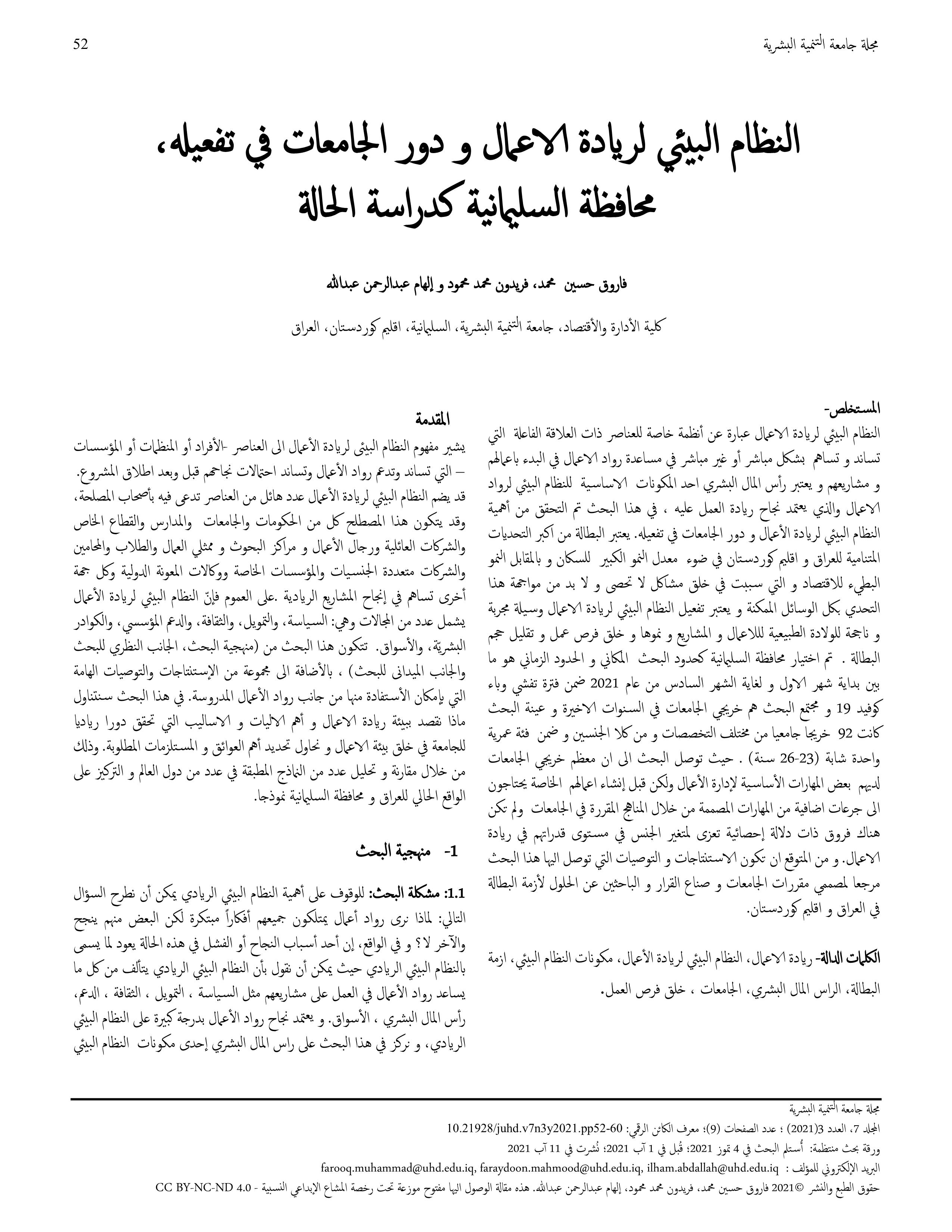The Entrepreneurial Ecosystem and the role of universities to activating it, Sulaymaniyah Governorate as a case study
DOI:
https://doi.org/10.21928/juhd.v7n3y2021.pp52-60Keywords:
entrepreneurship, entrepreneurship ecosystem, components of the ecosystem, unemployment crisis, human capital, universities, job creationAbstract
The entrepreneurship ecosystem is a special system of relevant stakeholders that support and contribute directly or indirectly to assist entrepreneurs to launch their businesses and projects. Human capital is one of the essential components of the entrepreneurs' ecosystem on which the success of entrepreneurship depends. This research investigated the importance of the entrepreneurship ecosystem and the role of universities in activating it. Unemployment is one of the biggest a growing challenges for Iraq and the Kurdistan Region in light of the large growth rate of the population and the slow growth of the economy, which has created countless problems. This challenge must be faced by all possible means. Activating the entrepreneurship ecosystem is a proven and successful method for the natural birth and growth of businesses and projects, creating job opportunities, and reducing unemployment. The province of Sulaymaniyah was chosen as the limits of the spatial research and the temporal boundary is between the beginning of the first month and until the sixth month of 2021 within the period of the outbreak of the Covid19 epidemic. The research population is university graduates in recent years, and the research sample was 92 university graduates from various disciplines, of both sexes, and within one age category (23-26 years). The research found that most university graduates have some basic skills for business management, but before establishing their businesses, they need additional doses of skills designed through the curricula established in universities, and there were no statistically significant differences due to the gender variable in the level of their entrepreneurial abilities. It is expected that the conclusions and recommendations reached by this research will be a reference for university curricula and syllabus designers, decision-makers, and researchers for solutions to the unemployment crisis in Iraq and the Kurdistan Region.
References
حسين، ميسون علي حسين، 2013، ريادية الاعمال ، الريادة في منظمات الاعمال – بحث نظري – مجلة جامهة بابل – العلوم الانسانية – المجلد 12- العدد 2 –ص 385
د. زريق، د.برهان زريق (2017)، التفويض في القانون الإداري، وزارة الإعلام السورية، الطبعة الأولي
المصادر الاجنبية
Aronsson, M. (2004). Education matters—but does entrepreneurship education? An interview with David Birch. Academy of Management Learning & Education, 3(3), 289-292.
Abbasi, M. H., Siddiqi, A. and Azim, R. U. A. (2011) ‘Role Of Effective Communications For Enhancing Leadership And Entrepreneurial Skills In University Students’, International Journal of Business and Social Science, 2(10), p. 9. Available at:http://search.proquest.com/docview/904512718?accountid=48385.
Cooper, A. C. (1985). The role of incubator organizations in the founding of growth-oriented firms. Journal of Business venturing, 1(1), 75-86.
De Winnaar, K. and Scholtz, F. (2020) ‘Entrepreneurial decision-making: new conceptual perspectives’, Management Decision, 58(7), pp. 1283–1300. doi: 10.1108/MD-11-2017-1152.
European Commission, 2006. Entrepreneurship education in Europe: fostering entrepreneurial mindsets through education and learning. In: Final Proceedings of the Conference on Entrepreneurship Education in Oslo.
Hermanto, B., 2017. Entrepreneurship ecosystem policy in Indonesia. Mediterranean Journal of Social Sciences, 8(1), pp.110-110.
Hitt, M.A., Ireland, R.D., Camp, S.M. and Sexton, D.L., 2002. Strategic entrepreneurship:Integrating entrepreneurial and strategic management perspectives. Strategic entrepreneurship: Creating a new mindset, 1, p.16.
Hofstede, G. (2011). Dimensionalizing cultures: The Hofstede model in context. Online readings in psychology and culture, 2(1), 2307-0919.
Isenberg, D. (2011). The entrepreneurship ecosystem strategy as a new paradigm for economic policy: principles for cultivating entrepreneurship: The Babson entrepreneurship ecosystem project. Babson College, Massachusetts, 1-13.
Krueger, N. F. (2007). What lies beneath? The experiential essence of entrepreneurial thinking. Entrepreneurship Theory and Practice, 31(1), 123-138.
McClelland, D. C. (1961). The achieving society. Princeton, NJ: Van Nostrand.
Malach Pines, A., Lerner, M. and Schwartz, D. (2010) ‘Gender differences in entrepreneurship: Equality, diversity and inclusion in times of global crisis’, Equality, Diversity and Inclusion: An International Journal, 29(2), pp. 186–198. doi: 10.1108/02610151011024493.
Malach-Pines, A. and Schwartz, D. (2018) ‘Now you see them, now you don’t: gender differences in entrepreneurship Ayala’, The Eletronic Library, 34(1), pp. 1–5. doi: 10.1108/02683940810896358.
Mason, C. and Brown, R. (2014) ‘Entrepreneurial Ecosystems and Growth Oriented Entrepreneurship, OECD, Local Economic and Employment Development Programme background paper’, Oecd, (January). Available at: file:///C:/Users/Romeo Ankisiwai/Downloads/OECDecosystems2014.pdf.
Mazzarol, T. and Reboud, S. (2020) Entrepreneurship as a Social and Economic Process. doi: 10.1007/978-981-13-9412-6_1.
Merriam-Webster's collegiate dictionary. Publisher: Springfield, Massachusetts, U.S.A. : Merriam-Webster, Incorporated, 2003.
Moore, J. F. (1993). Predators and prey: a new ecology of competition. Harvard Business Review, 71(3), 75-83.
Noermijati, Diana Primasari (2015) ‘The effect of job stress and job motivation on employees performance through job satisfaction (A study at PT. Jasa Marga (Persero) Tbk. Surabaya - Gempol branch). http://dx.doi.org/10.14414/jebav.v18i2.450
Phan, P. H., D. S. Siegel and M. Wright (2005), ‘Science parks and incubators: observations, synthesis and future research,’ Journal of Business Venturing, 20(2), 165–182
Pilotta, J. J. (2016) ‘Neoliberalism, Economic Radicalism, and the Normalization of Violence’, Neoliberalism, Economic Radicalism, and the Normalization of Violence, pp. 37–52. doi: 10.1007/978-3-319-25169-1.
Riggins, R. D. (1988) ‘Social Responsibility and the Public Sector Entrepreneur’, Journal of Physical Education, Recreation & Dance, 59(8), pp. 59–61. doi: 10.1080/07303084.1988.10606287.
Saed Hijjawi, G. and Al-Shawabkeh, K. M. (2017) ‘Impact of Strategic Agility on Business Continuity Management (BCM): The Moderating Role of Entrepreneurial Alertness: An Applied Study in Jordanian Insurance Companies’, International Journal of Business and Management, 12(10), p. 155. doi: 10.5539/ijbm.v12n10p155.
Scheiner, C. W. (2008) Christian Willi Scheiner Fundamental Determinants of Entrepreneurial Behaviour, Education.
Segal, G., Borgia, D. and Schoenfeld, J. (2005) ‘The motivation to become an entrepreneur’, International Journal of Entrepreneurial Behaviour and Research, 11(1), pp. 42–57. doi: 10.1108/13552550510580834.
Spilling, O. R. (1996). The entrepreneurial system: On entrepreneurship in the context of a mega-event. Journal of Business Research, 36(1), 91-103.

Downloads
Published
How to Cite
Issue
Section
License
Copyright (c) 2021 Farooq Muhammad, Faraydoon Mohammad Mahmood, Ilham Abdul-Rahman Abdallah

This work is licensed under a Creative Commons Attribution-NonCommercial-NoDerivatives 4.0 International License.


